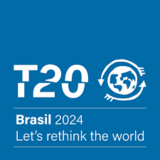External publications

Financing solutions for developing countries: quick wins
Grimm, Sven / Mavis Owusu-Gyamfi / Rob Floyd / Neuma Neuma / Brahima Coulibaly / Abbi Kedir / Karim, El Aynaoui / Iliana Olivié / Sara PantulianoExternal Publications (2024)
T20 Brasil, Task Force 3 (Reforming the International Financial Architecture), Policy Brief
The global financial architecture needs reform for the world to make progress on sustainable development and green industrialisation. Current geopolitical fragmentation and the financial squeeze experienced by several countries make it difficult to act on critical reforms. The clock is ticking for African and other developing economies. Their fiscal space is constrained by rising debt and exogenous shocks are mounting. Economic headwinds limit the financing options for developing countries, further curbed by an “Africa risk premium” and high interest rates on new borrowing. The world is not short of proposals to deal with these challenges, but not enough progress is being made. There is an urgent need to design macro-critical financing initiatives in such a way that they do not exacerbate the existing debt of several low-income countries (LICs (e.g. climate finance via the Resilience and Sustainability Trust-RST of IMF). The brief highlights short and medium-term actions for the G20, IFIs and development partners to ensure a better deal for developing countries. The G20 should take decisive action in at least three areas. First, about 60% of low-income countries are at high risk of debt distress or already in it, according to the World Bank. This compels them to choose between debt repayments or investing in health, education and social protection priorities. The G20’s Common Framework (CF) on debt restructuring is not working. It takes too long, excludes middle- income countries and comparability of treatment needs to be clarified. Second, the issuance of new Special Drawing Rights (SDRs) in 2021 in the wake of the Covid pandemic sought to bolster recovery from the impact of global lockdowns and strengthen health systems. But, apportionment of the SDRs according to the IMF quota system fell far short of needs and meant that only 4% went to LICs, defeating their aim. Third, IDA20, which had its replenishment frontloaded because of Covid, now faces a financial cliff, and the IDA21 replenishment could see a net decline in contributions. The policy brief articulates key actions needed: ➢ overhaul the CF to ease the debt burden of many developing countries, ➢ rechannel SDRs to provide fiscal space to poor nations, ➢ strongly replenish the IDA to ensure adequate concessional financing for the SDGs. This should be followed by a strong ADF replenishment.
Contact
Cornelia Hornschild
Publication Coordinator
E-mail Cornelia.Hornschild@idos-research.de
Phone +49 (0)228 94927-135
Fax +49 (0)228 94927-130
Alexandra Fante
Librarian/ Open Access Coordinator
E-Mail Alexandra.Fante@idos-research.de
Telefon +49 (0)228 94927-321
Fax +49 (0)228 94927-130



![[Translate to English:] Photo: Alexandra Fante, Bibliothekarin/Open Access-Koordinatorin](/fileadmin/_processed_/f/0/csm__c_Deutsches-Institut-fuer-Entwicklungspolitik_Fante_94ce4fa1ba.jpg)